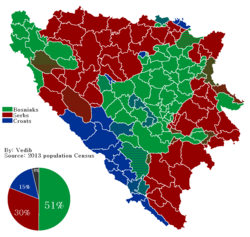
Today, Bosnia is the only country in the world where the largest national-religious group is Slavic Muslims - Bosniaks: 50% of the country's population are followers of Islam. This fact is reflected in many areas of Bosnia's public life - particularly in the names of its citizens.
Bosnian surnames carry a rich tapestry of cultural, historical, and linguistic influences, reflecting the complex heritage of the region. These surnames are often a blend of Slavic, Turkish, and occasionally Arabic elements, showcasing the diverse roots of Bosnia and Herzegovina's population. One distinctive feature of Bosnian surnames is the prevalent use of the suffixes "-ić" or "-vić." These suffixes indicate a patronymic origin, meaning "son of." For example, the surname "Ivanović" means "son of Ivan." This convention is shared with neighboring Slavic cultures and is a testament to the interconnectedness of the region.
Derivation of Bosnian surnames
However, Bosnian surnames also bear the imprint of centuries of Ottoman rule. Many Bosnian surnames have Turkish origins, reflecting the influence of the Ottoman Empire on the Balkans. Surnames like "Izetbegović" or "Islamović" are examples of this Turkish influence. These surnames often derive from personal names, titles, or occupations prevalent during the Ottoman era.
Additionally, Bosnian surnames occasionally incorporate Arabic elements, especially those related to Islamic culture. Names like "Hasanović" or "Kerimović" may have Arabic roots, signifying qualities or virtues esteemed in Islamic tradition.
Furthermore, Bosnian surnames can also be indicative of familial or tribal ties. Surnames like "Hadžihafizbegović" or "Hadžalić" suggest connections to the Hajji, a title given to someone who has completed the Hajj pilgrimage to Mecca. These surnames may denote a family's religious devotion or ancestral pilgrimage.
It's essential to note that Bosnian surnames are not exclusive to any one ethnic group. While they may be more commonly associated with Bosniak Muslims, they are also found among Serbs, Croats, and other ethnic communities residing in Bosnia and Herzegovina. This diversity underscores the country's multicultural fabric and the interwoven nature of its history.
Most common Bosnian surnames

The most common Bosnian surnames reflect the country's diverse cultural heritage and historical influences. While it's challenging to pinpoint an exhaustive list due to variations in data sources and methodologies, several surnames consistently appear among the most prevalent in Bosnia and Herzegovina. Here are some examples:
- Hodžić: This surname is believed to have Turkish roots and is common among Bosniaks, reflecting the Ottoman influence in the region.
- Musić: Another common Bosniak surname, "Musić" likely derives from the Turkish word "müslim," meaning "Muslim."
- Hadžić: The prefix "Hadži-" indicates a connection to the Hajj pilgrimage to Mecca, suggesting a family's religious devotion.
- Delić : The surname "Delić" is believed to have Turkish origins and is common among Bosniak Muslims. It is derived from the Turkish word "deli," which means "brave," "courageous," or "fearless."
- Jovanović : The surname "Jovanović" is a common Serbian surname. It is derived from the given name "Jovan," which is the Serbian equivalent of the name "John" in English. "Jovan" itself is derived from the Greek name "Ιωάννης" (Ioannis), which means "Yahweh is gracious."
- Ivanović: Reflecting Slavic origins, this surname is derived from the personal name "Ivan," meaning "John." It's common among Bosnian Serbs.
- Marković: Similarly, "Marković" is derived from the personal name "Marko," meaning "Mark," and is prevalent among Bosnian Serbs.
- Petrovic: The surname "Petrović" is derived from the given name "Petar," which is the Serbian form of the name "Peter." "Petar" itself is of Greek origin, derived from the word "petros," meaning "rock" or "stone."
- Kovačević: This surname is derived from the Serbian word "kovač," meaning "blacksmith," and is common among Bosnian Serbs.
- Karačić: With Turkish roots, "Karačić" likely means "son of Kara," where "Kara" denotes "black" or "dark" in Turkish.
- Kovačić: Another surname derived from the occupation of blacksmith ("kovač" in Croatian/Serbian), it's common among Croatians and Bosnian Croats.
- Hrnjica: This surname is believed to have originated from the Bosnian word "hranj," meaning "grain," reflecting agricultural ties.
- Tanović: The surname "Tanović" is a common Bosnian surname, primarily associated with Bosniak Muslims. It is derived from the personal name "Tan," which may have Turkish or Persian origins. "Tan" can mean various things in different languages, including "dawn," "body," or "soul."
History of Bosnian surnames

The use of surnames in Bosnia can be traced back to the medieval period, although it was not as systematic as in contemporary times. During this era, surnames were often derived from personal characteristics, occupations, or places of origin. For example, surnames like "Bijelić" (meaning "white") or "Kovač" (meaning "blacksmith") were common.
The Ottoman Empire's conquest of Bosnia in the 15th century introduced significant changes to the region's social structure and naming conventions. Turkish influence led to the adoption of patronymic surnames, marked by the suffixes "-ović" or "-begović," meaning "son of" or "descendant of." This era also saw the emergence of Turkish-derived surnames based on personal names, titles, or occupations, reflecting the cultural amalgamation under Ottoman rule.
With the decline of the Ottoman Empire in the late 19th century, Bosnia came under Austro-Hungarian administration. This period brought about modernization and administrative reforms, including the standardization of surnames for official records. While the patronymic tradition persisted, there was also an increase in the adoption of occupational surnames or names derived from physical characteristics.
Following World War I, Bosnia became part of the Kingdom of Yugoslavia. This period witnessed a degree of cultural homogenization, with efforts to promote a unified Yugoslav identity. While Bosnian surnames continued to reflect their historical roots, there was also a trend towards simplification and regularization of surnames to comply with administrative requirements.
The breakup of Yugoslavia in the 1990s and the Bosnian War brought significant upheaval to the region. This period saw migrations, displacements, and changes in demographics, influencing naming practices. Despite these challenges, Bosnian surnames have retained their rich diversity, reflecting the multicultural fabric of modern Bosnia and Herzegovina.
See also
Explore more about Bosnian surnames
- Austria-Hungary, World War I Casualty Lists, 1914-1918 records collection at MyHeritage. Rhe collection contains records of individuals born in modern-day Austria, Hungary, Czechia (formerly Bohemia or Moravia), Poland (formerly Galicia), Ukraine (formerly Galicia), Croatia, and Bosnia and Herzegovina.
- Croatian, Serbian, and Bosniak Family Names


